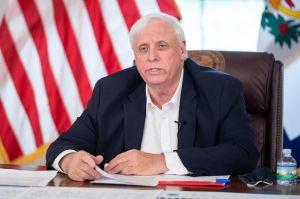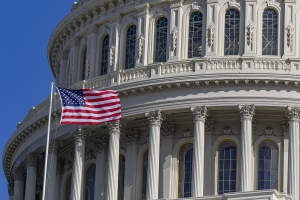Wake Up Call for US Lawmakers
S&P's Announcement Spurs on a Scolding
Hours after Standard & Poor's decision to strip the U.S. of its prized triple-A rating late Friday, China issued some harsh statements warning Washington lawmakers to “cure its addiction to debts” and “live within its means.”
The global rating agency, which said Friday it was dissatisfied with the plan Congress came up with earlier in the week to reduce the country's debt, downgraded the nation’s coveted AAA long-term credit rating and lowered it by one notch to AA-plus.
This is the first time the U.S. credit rating has fallen below the highest level, triple A. The U.S. has held the rating since 1917.
“The downgrade reflects our view that the effectiveness, stability, and predictability of American policymaking and political institutions have weakened at a time of ongoing fiscal and economic challenge,” S&P said in its report.
The world is watching the U.S. economic problems implode and S&P’s announcement spread like wildfire across the global market scene.
The downgrade is a major embarrassment for the Obama administration and could raise the cost of US government borrowing. This could trickle down to higher interest rates for local governments and individuals, economists said Saturday.
Financial experts from across the globe are now commenting negatively on Washington's last-minute deal to slow down the ballooning growth of America's debt and that it was obviously not enough to please the agency.
For Asian governments, the downgrade is bad news especially for China, which is the largest holder of U.S. debt.
"The spluttering world economic recovery would be very likely to be undermined and fresh rounds of financial turmoil could come back to haunt us all," Chinese newspapers said Saturday.
Any disruptions to the U.S. economy, a major market for Asian exporters, would have serious implications for Asia's economy, according to the Wall Street Journal.
Jiang Xufeng with China’s official Xinhua news agency wrote a harsh opinion on Saturday basically scolding U.S. lawmakers.
Xufeng writes "the U.S. government has relied on borrowing to fund its operations in recent decades and has seldom carried out a serious fiscal austerity plan."
“That's why its debt ceiling has been raised 78 times to 14.29 trillion dollars since 1960."
Legal analysts say Beijing will probably continue to purchase United States Treasury bonds.
However, Chinese officials are clearly concerned that China’s substantial holdings of American debt, worth at least $1.1 trillion, is being devalued.
“The U.S. government has to come to terms with the painful fact that the good old days when it could just borrow its way out of messes of its own making are finally gone,” the commentary in the Chinese newspaper said.
The only good news, analysts say, is that if China pulls back from purchasing Treasuries, the dollar would weaken and America’s borrowing costs would rise sharply, but that would also hurt China’s existing holdings.
“International supervision over the issue of U.S. dollars should be introduced and a new stable and secured global reserve currency may also be an option to avert a catastrophe caused by any single country,” the commentary said.
U.S. lawmakers cannot say they were not warned that its coveted rating was in danger of a downgrade.
Standard & Poor's issued the sternest of warnings even during Congress' messy negotiations earlier in the week.
Financial experts said the agency was "under tremendous pressure not to downgrade" even after lawmakers reached a deal.
Late Friday, the company notified the Treasury that it planned to “issue a downgrade after the markets closed,” and sent the department a copy of the announcement.
Stephen B. Meister with the New York Post also warned lawmakers earlier this week that the rating agencies know there’s simply “no way to truly implement significant spending cuts without reforming Social Security. And the tools to do it are out there: increasing the retirement age, reducing inflation adjustments, means testing and more.”
Meister said the credit raters will know the polls lack the will to make the cuts real.
“Let's get real … the ratings agencies know this eleventh-hour deal won't cure our addiction to borrowing - so get ready to lose that AAA rating, Uncle Sam,” he said before Congress approved the bill this week.
Experts said that without strong economic growth and job creation, it would be difficult for the United States to generate robust revenue increases and improve its fiscal condition over the long run.
Economists said Saturday that Japan, the second largest creditor to the U.S. after China, believes the U.S. Treasury is still a good investment despite the S&P move this week.
"The trust we have in U.S. Treasury and their attractiveness as an investment will not change because of this action," a senior Japanese government official told Dow Jones Newswires.
Yoon Jong-won, a senior official at South Korea's Ministry of Strategy and Finance, told Dow Jones that while the credit downgrade isn't a good news, local authorities "will first watch the market and see how it reacts to the downgraded rating."
"It's not clear how much additional shock this downgrade will bring," Jong-won told Dow Jones.
"We'll first have to see how the U.S. market reacts to the news in terms of how big a movement in capital occurs there and at what pace."
What is the bottom line?
The bottom line is that the S&P's downgrade could lead investors to demand higher interest rates from the federal government and other borrowers, raising costs for governments, businesses and home buyers, according to financial analysts quoted in The New York Times.
Many analysts confirmed Saturday that the impact could be minimal because the other ratings agencies, Moody’s and Fitch, have decided not to downgrade the U.S. government right now.
S&P’s bad news came after markets closed for the weekend and there was no evidence of any immediate moves to opt out of big U.S. investments.
A spokesman for the Federal Reserve told The New York Times Saturday that S&P’s decision would not affect the ability of banks to borrow money by pledging government debt as collateral.
Downgrade or no downgrade, the economy will survive, most economists are saying. Even with a downgrade, the U.S. Treasury bonds will remain about the safest investment around.
“In the end losing the coveted AAA rating might actually be a good thing for America, because once U.S. debt is no longer considered 'risk-free,' politicians will have to think twice before making 'unsustainable spending commitments,'" The Economist reports.
S&P’s announcement makes clear, the inadequacy of the debt deal was not their only motivation to issue the downgrade.
"It was the the reckless and divisive battle that preceded it," The Economist said today.
"Absent the toxic politics that infected the debate, we could have hammered out a deal that stabilized the debt without squeezing the economy too much in the near term. After all, Britain, Germany and even Italy seem able to do so, and we have in the past, too. Investors won't learn much new from S&P's announcement. Politicians should."
Job creation and growth are pressing tasks for the nation now more than ever before.
Americans don’t like the debt ceiling deal lawmakers agreed to, they do not like the way Washington is handling the economy, and confidence in our political leaders is low and getting lower, according to recent Rasmussen polls.
Only 38 percent of investors now believe their investment portfolio is worth more than it was a year ago, according to the Rasmussen Consumer Index today.
Given a choice of investment options, investors are more likely to place new investment money in a savings account than the stock market.
Ironically, even though the downgrade happened on President Obama’s watch, most voters think he has a good chance of being reelected next year anyway, Rasmussen reports.
One tough lesson the U.S is learning is more along the lines of an optimistic take.
Behavior of the markets and record disapproval ratings will force Congress to acknowledge the "idiocy of their recent behavior and to adapt by substituting compromise for brinkmanship."
Standard and Poor's said it will issue separate releases on Monday concerning affected ratings in the funds, government-related entities, financial institutions, insurance, public finance, and structured finance sectors.





























